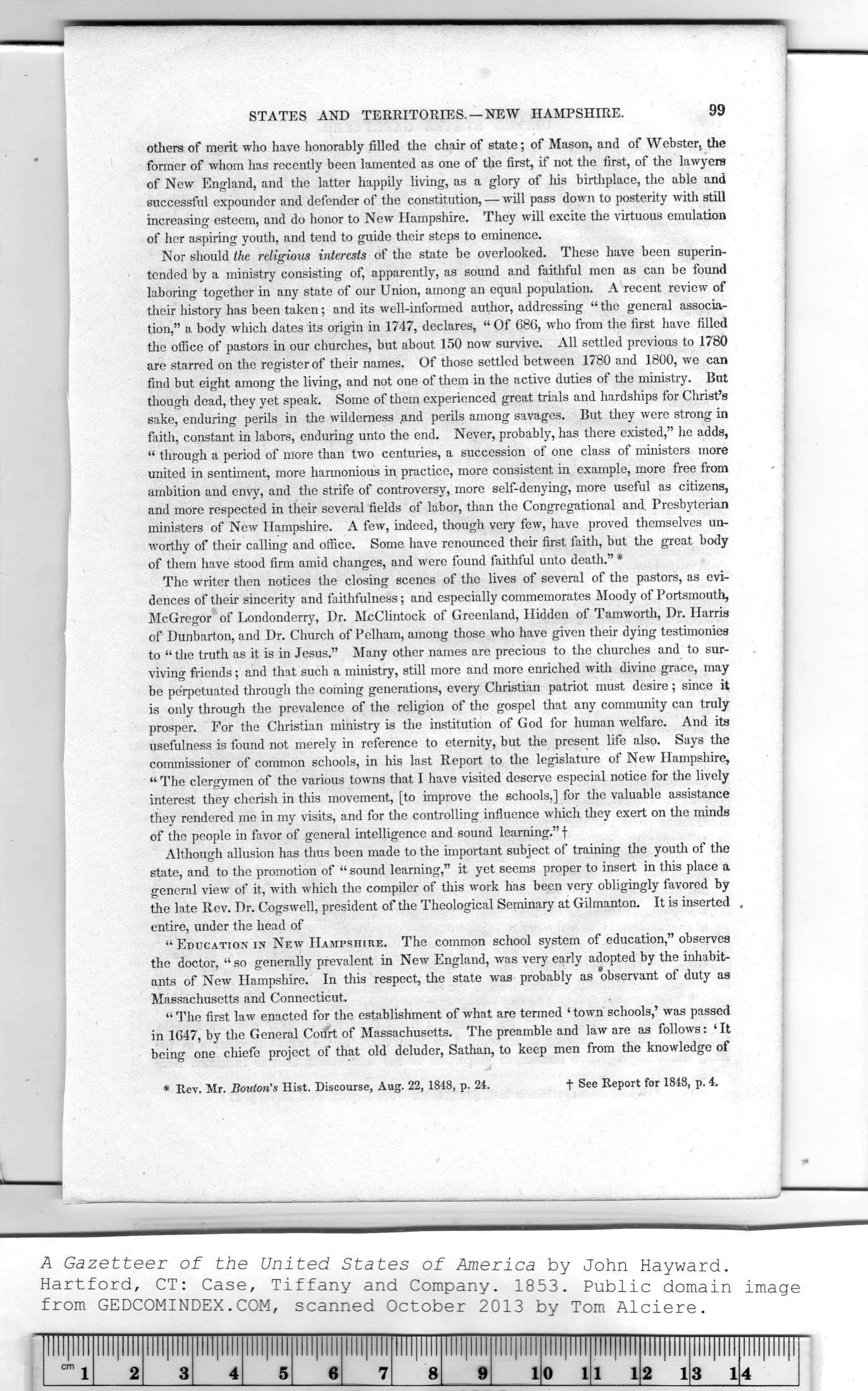|
|
Note: Ctrl and + increases the font size of the text below, Ctrl and - decreases it, and Ctrl and 0 resets it to default size.
STATES AND TERRITORIES. — NEW HAMPSHIRE. 99
others of merit who have honorably filled the chair of state; of Mason, and of Webster, the
former of whom has recently been lamented as one of the first, if not the first, of the lawyers
of New England, and the latter happily living, as a glory of his birthplace, the able and
successful expounder and defender of the constitution, — will pass down to posterity with still
increasing esteem, and do honor to New Hampshire. They will excite the virtuous emulation
of her aspiring youth, and tend to guide their steps to eminence.
Nor should the religious interests of the state be overlooked. These have been superin-
tended by a ministry consisting of, apparently, as sound and faithful men as can be found
laboring together in any state of our Union, among an equal population. A recent review of
their history has been taken; and its well-informed author, addressing “ the general associa-
tion," a body which dates its origin in 1747, declares, “ Of 686, who from the first have filled
the office of pastors in our churches, but about 150 now survive. All settled previous to 1780
are starred on the register of their names. Of those settled between 1780 and 1800, we can
find but eight among the living, and not one of them in the active duties of the ministry. But
though dead, they yet speak. Some of them experienced great trials and hardships for Christ's
sake, enduring perils in the wilderness ,and perils among savages. But they were strong in
faith, constant in labors, enduring unto the end. Never, probably, has there existed," he adds,
“ through a period of more than two centuries, a succession of one class of ministers more
united in sentiment, more harmonious in practice, more consistent in example, more free from
ambition and envy, and the strife of controversy, more self-denying, more useful as citizens,
and more respected in their several fields of labor, than the Congregational and. Presbyterian
ministers of New Hampshire. A few, indeed, though very few, have proved themselves un-
worthy of their calling and office. Some have renounced their first faith, but the great body
of them have stood firm amid changes, and were found faithful unto death." *
The writer then notices the closing scenes of the lives of several of the pastors, as evi-
dences of their sincerity and faithfulness; and especially commemorates Moody of Portsmouth,
McGregor of Londonderry, Dr. McClintock of Greenland, Hidden of Tamworth, Dr. Harris
of Dunbarton, and Dr. Church of Pelham, among those who have given their dying testimonies
to “the truth as it is in Jesus." Many other names are precious to the churches and to sur-
viving friends; and that such a ministry, still more and more enriched with divine grace, may
be perpetuated through the coming generations, every Christian patriot must desire ; since it
is only through the prevalence of the religion of the gospel that any community can truly
prosper. For the Christian ministry is the institution of God for human welfare. And its
usefulness is found not merely in reference to eternity, but the present life also. Says the
commissioner of common schools, in his last Report to the legislature of New Hampshire,
“ The clergymen of the various towns that I have visited deserve especial notice for the lively
interest they cherish in this movement, [to improve the schools,] for the valuable assistance
they rendered me in my visits, and for the controlling influence which they exert on the minds
of the people in favor of general intelligence and sound learning." f
Although allusion has thus been made to the important subject of training the youth of the
state, and to the promotion of “ sound learning," it yet seems proper to insert in this place a
general view of it, with which the compiler of this work has been very obligingly favored by
the late Rev. Dr. Cogswell, president of the Theological Seminary at Gilmanton. It is inserted
entire, under the head of
“ Education in New Hampshire. The common school system of education," observes
the doctor, “so generally prevalent in New England, was very early adopted by the inhabit-
ants of New Hampshire. In this respect, the state was probably as observant of duty as
Massachusetts and Connecticut.
“ The first law enacted for the establishment of what are termed ‘ town schools,' was passed
in 1647, by the General Court of Massachusetts. The preamble and law are as follows: ‘ It
being one chiefe project of that old deluder, Sathan, to keep men from the knowledge of
* Rev. Mr. Bouton's Hist. Discourse, Aug. 22, 1848, p. 24. f See Report for 1848, p. 4.
|
Illllllll |
Illllllll |
Illllllll |
Illllllll |
Illllllll |
Illllllll |
Illllllll |
Illllllll |
llll|llll |
Illllllll |
Illllllll |
Illllllll |
Illllllll |
Illllllll |
|
|
cm j |
2 |
3 |
4 |
5 |
6 |
7 |
8 |
9 |
1 |
0 1 |
1 1 |
2 1 |
3 1 |
4 |
|
